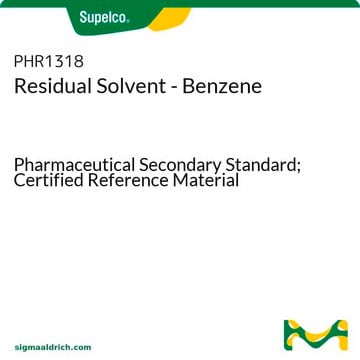PHR1561
Tetrahydrofuran
Pharmaceutical Secondary Standard; Certified Reference Material
Synonym(s):
Tetrahydrofuran, Butylene oxide, Oxolane, Tetramethylene oxide
About This Item
Recommended Products
grade
certified reference material
pharmaceutical secondary standard
Quality Level
Agency
traceable to USP 1601770
vapor density
2.5 (vs air)
vapor pressure
114 mmHg ( 15 °C)
143 mmHg ( 20 °C)
CofA
current certificate can be downloaded
autoignition temp.
610 °F
expl. lim.
1.8-11.8 %
packaging
ampule of 3x1.2 mL each
technique(s)
HPLC: suitable
gas chromatography (GC): suitable
refractive index
n20/D 1.407 (lit.)
bp
65-67 °C (lit.)
mp
−108 °C (lit.)
density
0.889 g/mL at 25 °C (lit.)
application(s)
pharmaceutical (small molecule)
format
neat
storage temp.
2-30°C
SMILES string
C1CCOC1
InChI
1S/C4H8O/c1-2-4-5-3-1/h1-4H2
InChI key
WYURNTSHIVDZCO-UHFFFAOYSA-N
Looking for similar products? Visit Product Comparison Guide
General description
Application
Analysis Note
Other Notes
Footnote
Signal Word
Danger
Hazard Statements
Precautionary Statements
Hazard Classifications
Acute Tox. 4 Oral - Carc. 2 - Eye Irrit. 2 - Flam. Liq. 2 - STOT SE 3
Target Organs
Central nervous system, Respiratory system
Supplementary Hazards
Storage Class Code
3 - Flammable liquids
WGK
WGK 1
Flash Point(F)
-6.2 °F - closed cup
Flash Point(C)
-21.2 °C - closed cup
Choose from one of the most recent versions:
Already Own This Product?
Find documentation for the products that you have recently purchased in the Document Library.
Customers Also Viewed
Protocols
GC Analysis of Class 3 Residual Solvents on SUPELCOWAX® 10
Related Content
Butyl methyl ether; Acetic acid; 2-Butanone; Ethyl acetate; Tetrahydrofuran; 1-Butanol; Isopropyl acetate; Heptane; Propyl acetate; 3-Methylbutanol; 4-Methyl-2-pentanone; Isobutyl acetate; Butyl acetate; Dimethyl sulfoxide; Anisole; Cumene
Our team of scientists has experience in all areas of research including Life Science, Material Science, Chemical Synthesis, Chromatography, Analytical and many others.
Contact Technical Service












